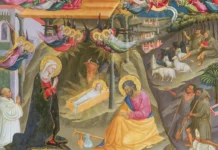Dr. Plinio’s desire to serve the Church wisely and effectively turned a simple parish publication called “Legionário” into Brazil’s most combative and influential Catholic newspaper.
At the age of twenty-five, I felt that I was born to serve the Catholic Church. It was she who gave meaning to my existence. And the more I dedicated myself to this service, the more clearly I saw the enormous crisis affecting temporal society, creating problems for the Church; the gravity of these problems was all too apparent to me.
Therefore, my entire future had to be dedicated to helping the Catholic cause prevail, revolving around one central axis, namely, the triumph of the Church’s interests.
Precisely at the time when my mind was absorbed in these thoughts, I began to manage a small monthly newspaper in the Parish of St. Cecilia in São Paulo, called Legionário. When I was still a federal deputy, I had been invited to be its director, to contribute to its growth. I thought it was a good idea, and wished to support it, so I accepted: “You can put my name on it right away,” I told them, “but I will only take over when the parliamentary duties come to an end.”
Consequently, at the end of my mandate in the National Constituent Assembly, I was asked to assume the effective direction of the Legionário. I realized that it was a promising means of apostolate and that it could become an excellent one, provided that I had a good editorial team and that I made good use of the newspaper to achieve the objectives I had in mind.
A Catholic newspaper with international impact

To this end, I enlisted some friends to help me in the editorial and administrative work. On Wednesdays, we held an evening meeting in which we established the subjects to be dealt with and distributed the articles and sections among the writers. As a means of developing our group we began to invite the more intelligent young men from the various Marian congregations to write for Legionário.
After some time, the paper became a weekly, moving towards becoming e a daily, which was my goal. This complete reformulation was aimed at making it the first Catholic newspaper in Brazil. Through the merciful protection of Our Lady, we succeeded. Legionário soon began to influence the internal life of Catholics in the Brazilian states of Rio de Janeiro, Minas Gerais, Rio Grande do Sul and Pernambuco. It had repercussions outside our borders, in Montevideo, Buenos Aires, a little in Santiago de Chile, even in Europe and, albeit less frequently, in the United States.
Legionário thus became a means for our milieu and our ideas to exert a wide influence. This was precisely our goal.
Change inspired by a French newspaper
I gained much insight into the influence and mode of action I wanted for the periodical from observing a newspaper called Sept, a French biweekly with approximately the same number of pages as Legionário.
It was very dynamically organized, with an attractive layout and timely topics. As a result, despite being a modest little newspaper of few pages – it circulated in France and Belgium at the time – it had impact and spoke out about events, influencing them. In a word, it dealt with the most pressing and sensitive issues of the day.
Until then, Legionário’s tendency had been to address the general public, in the interest of winning them over. It was written partly for the purpose of converting non-Catholics and partly to rekindle and guide Catholics. Reading Sept newspaper, I realized that this was wrong, for a small-sized periodical must aim at one specific public that is influential and sizeable, and through this public influence the whole, or it would serve no purpose.
A clear objective: to form the mentality of Catholics
Accordingly, Legionário ceased to be a newspaper for converting non-Catholics and became a newspaper for guiding Catholics. And not just any Catholics, but those of the Catholic Movement.
The Catholic Movement was made up at that time of the most fervent faithful, who went to Mass on Sundays and generally belonged to religious associations. It was so called because it was a very large group of people who devoted part or all of their time to promoting, through their activity, the Catholic Church, and the spreading of the Faith.

I clearly understood that, by acting on this public and guiding it, we would have the possibility of influencing events in Brazil as a whole. Thus I transformed the Legionário into a specialized organ for the Catholic Movement. Its purpose was not to help Catholics to convert non-Catholics, but to form the former’s mentality.
How to attract and persuade
I soon realized that in this newspaper we had to deal with the most current affairs, making a rigorously Catholic critique and, therefore, taking topics which no Catholic paper in Brazil dealt with at that time, and helping the public to consider them from a religious perspective. Legionário had to delve into these topics and cover them with courage, setting the tone!
On the other hand, once this objective was achieved, how could it be used to combat the Revolution? To combat it, one had to persuade. Now, how to persuade? Through reasoning? Through sympathy? How to attract good will? What obstacles might this good will encounter? And finally, if we could neither attract nor persuade, what should we do?
These are the questions asked by someone who has a small Catholic newspaper at his disposal and wants to put it to use for a great mission – someone who knows that much can be done with so little, and who wants to take the best possible advantage of it.
To persuade a reader, the first thing necessary is to deal with subjects that interest him; otherwise, it is impossible to keep his attention. Someone might say: “But he is not interested in the subjects I write about.” My reply is: “Then find a way of presenting the subject in such a way as to arouse his interest.” That is to say, one must study the psychology of the reader to discover how to interest him.
This calls for a fully articulated concept of mentalities. We need, then, to observe mentalities; otherwise, we will not be capable of achieving anything in this context.
Second question: having caught the reader’s attention, how can we persuade him? It is necessary to present the reasoning very well, with clarity and simplicity, without pretension, directly. The argument must penetrate the mentality of the person who has erred, much as a disinfectant penetrates to the core of the wound of one who has an exposed infection. The patient may experience pain and squirm, but the pathogen dies.
Superb reasoning and a rich vocabulary

The reasoning should be as pleasing as possible. However, it is not enough to use beautiful words. The best approach is to make the reader sense the beauty of the argument as such. Unadorned thought, presented in its simplicity and clarity, has a beauty of its own, like that of lightning; and this is what the writer should transmit to the reader.
A rich vocabulary is indispensable for this. One must have at his fingertips an entire dictionary well studied and well implemented, or one will accomplish nothing.
The writer should know how to capitalize on the qualities of the Portuguese language, instead of trying to imitate the magnificent languages of other peoples. Everyone ought to take advantage of the beauties of his own vocabulary.
In the Portuguese language, due to a world of imponderables, one word may differ from one another by just a shade of meaning, while a second word is just slightly different from a third, and the third from the fourth, and so on, which imparts a wonderful precision to that which one wishes to express.
It was necessary to accustom the Legionário editors to these imperatives.
Long or short sentences?
Some interesting questions arise in the precise weighing and measuring of all these factors. For example, should long or short sentences be used?
Short sentences are easier to understand. But such a statement says very little, because it is equivalent to affirming that, for the world of simpletons, it is the only possible form of communication. And yet this is not true. The short sentence is distinguished by its simplicity, with a usefulness and charm of its own. For a succinct example, let us consider the Gospels: they have every degree and form of beauty, for they are inspired by the Holy Spirit, but they have no long sentences.
Does a long sentence have any beauty? Indeed, a great deal of beauty. The construction of the long sentence, allowing for the harmonious dovetailing of various ideas, presents an ensemble of thoughts. As such, it accustoms the mind to considering sets rather than mere elements, and in this respect it develops the capacity for synthesis – not in the sense of abbreviating, but of grouping, cohering and classifying – which is an eminent human quality.
Then we should look a little at our own tendency. Individually, do we lean towards the long or the short sentence? Considering our inclination, we should seek to make the most of it. For my part, I am very much inclined towards long sentences.
The art of conversation gives life to the art of writing
Where does this tendency come from? I also had contact with the art of conversation, although already in its final stages. I observed and admired it enormously, seeking to develop it as much as my natural qualities would permit. Long before the Legionário, when I was ten or eleven years old, I endeavoured to engage in interesting conversation. For I understood that from the moment I found what I was saying interesting, my worlds would take on life, and would thus come to interest others.
The art of conversing imparts extraordinary life to the art of writing. The reader should feel that the writer is having a conversation with him. Perhaps something of this can be noted in my articles.
So it was necessary to develop the art of conversation among the writers of Legionário. For this purpose, at night, during the period when the young men were working on the articles, there was a break during which coffee was served. I would then come out of my room and strike up a conversation with everyone. I was sure that, indirectly, I was teaching them to write.
Coherent ideas
Legionário had a certain characteristic note.
According to the ideas prevailing at the time, ideological debates were restricted to the political, social and economic sphere. Legionário expanded the scope. It demonstrated that religious-philosophical and socio-political-economic preferences can manifest themselves in everything: in the shape of a chandelier, the colour of a vase, the texture of a fabric, the designs of a plate or a glass and in the taste of a food or drink… Everything conveys a tendency.
In this way, Legionário was waging what today would be called a cultural counter-revolution. By cultural revolution we mean precisely that: a revolution that is not only political, but involves a transformation of mentality, of the way of being and of the ambiance that surrounds man.
The cultural counter-revolution is the counter-revolution in ideas, united the the counter-revolution in tendencies; combined, they constitute a whole. This results in the notion that the Revolution and the Counter-Revolution encompass the whole of human thought. And that either a man is a monolith, or he is nothing.
All that is good in society comes from the Catholic Church
Another very prominent principle in the Legionário’s orientation was this: all that is good in human society comes from the Catholic Church.
Original sin deeply wounded human nature, but not to the point of corrupting it entirely. The Church condemns the assertion that man, by his simple natural forces, cannot perform good actions. However, Catholic doctrine also teaches that, without the help of grace, he cannot steadfastly and durably persevere in the practice of the Ten Commandments.

Second point: if in a given society the violation of one or more Commandments becomes habitual, that society is heading for decline; there is no alternative. Perfect human order derives from the observance of the Commandments. Failing this, order falls apart; it is just a question of time…
Third: if, on the contrary, human society as a whole – barring the few exceptions, which always exist – stably observes the Ten Commandments, it ascends to a magnificent pinnacle. Even if it is a small country without economic resources, if the people have great faith, they will ascend to the highest degree possible in the temporal order.
Moreover, the higher a society ascends in the temporal order – in terms of culture, wealth or any other factor – the greater need it has to carefully observe the Commandments and to love God. For if these natural qualities are not guided by virtue and by the habitual practice of the Ten Commandments, these very elements of greatness will precipitate its fall. In other words, the intellectual decay of highly educated countries, when they lose their faith, becomes so delusional and grave that it tends to lead them headlong into insanity. ◊
Taken, with adaptations, from Dr. Plinio.
São Paulo. Year III. No.25 (Apr., 2000);
Year VI. No.61 (Apr., 2003); No.62 (May, 2003)
In the featured photo: Dr. Plinio in1968







